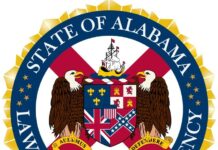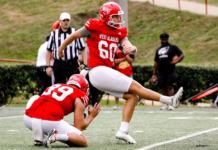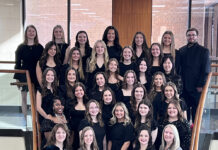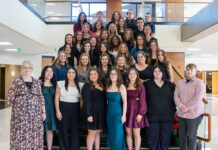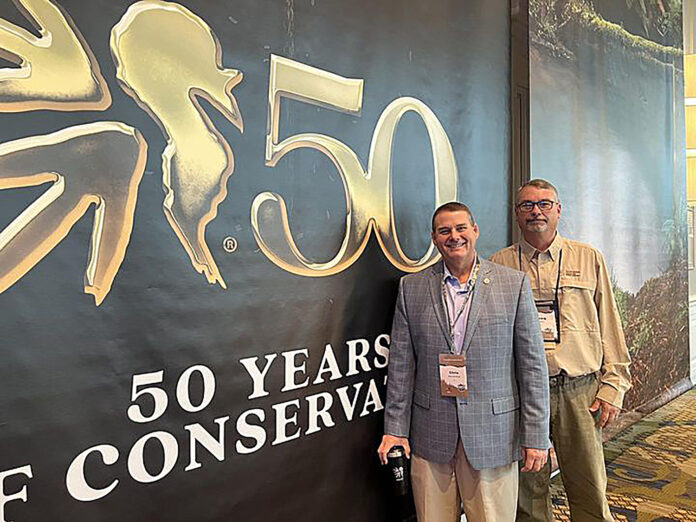
MONTGOMERY, Ala. – At the recent National Wild Turkey Federation (NWTF) Convention celebrating the 50th anniversary of the organization, the Alabama Chapter received the prestigious Acreage Award for land conservation in the state. In 2022, the NWTF Alabama State Chapter conserved or enhanced more acres than any other state chapter.
“We’re very proud Alabama won the award for conserving the most acres in the country last year,” said NWTF Alabama State Chapter President Craig Harris. “It was right at 146,000 acres. That’s pretty neat on the 50th anniversary to do that.”
NWTF co-CEO Kurt Dyroff added, “Our state chapters and their volunteer leadership never cease to amaze me. It is their innovation, collaboration and dedication that have allowed us to reach many milestones. It is an honor to recognize the Indiana and Tennessee state chapters with the Save the Habitat Award as well as the Alabama State Chapter with the Acreage Award, at our 50th anniversary celebration.”
Harris said the work NWTF has done over the past 50 years is mind-boggling, especially since the NWTF Hunting Heritage Super Fund was established in 1985.
“One of the biggest things that stood out to me is the fact we have funded 50,000 Super Fund projects over the years,” Harris said. “That’s just really impressive when you think about it.”
In addition to the Acreage Award, the Alabama State Chapter also received the L.A. Dixon Outstanding State Chapter Award, which is presented to state chapters in recognition of their fundraising achievement through banquets, membership recruitment and mission delivery on behalf of the NWTF. Local Alabama chapters were also recognized. The Auburn University Chapter had the highest net dollars and highest adult membership for college and university chapters, while the Henry County Longbeards and Magic City Limb Hangers joined the Grand Slam Club, and Tuscaloosa and East Alabama made the Royal Slam Club. Clay County and Turkey Heaven were recognized for fundraising, and the South Pickens Limbhangers took the award for the best first-time banquet.
Alabama Department of Conservation and Natural Resources’ (ADCNR) Chuck Sykes, Director of Wildlife and Freshwater Fisheries (WFF), attended the 50th anniversary convention in Nashville, and he was impressed by the enthusiasm and record crowd of 67,368 attendees.
“From walking the floors, there were tons of people, tons of families,” Sykes said. “A lot of people were spending money. The vendors had a good show from what I saw. Celebrating 50 years is a milestone for an NGO (non-governmental organization). Not many last that long.
“I’ve been going to the NWTF Convention for 25 years, so probably half of their existence. Long before I became Director, with my consulting business and TV show, I always had a booth at the NWTF Convention because it was my audience. It was hunters, landowners and people wanting to manage habitat for turkeys. In the beginning, NWTF was extremely instrumental in helping states restock to get turkeys to huntable levels.”
Since Sykes became WFF Director 10 years ago, he said the support from the NWTF Alabama State Chapter has made a significant impact. In 1985, NWTF developed its Hunting Heritage Super Fund program to recruit volunteers to conduct banquets and fundraisers to provide funding for conservation projects in their respective states.
“We work with a lot of NGOs,” he said. “I’ll have to say our state chapter of NWTF is as solid a partner as we could ask for, helping us buy equipment, helping us buy land and helping us with some staff positions. They really do put their money where their mouth is. When they first started the Super Fund projects, WMA (wildlife management area) biologists would send in a request for a plow, a sprayer or drip torches. The NWTF would buy them because it was a lot easier to go through an NGO than through the purchasing process. It worked really well.
“After I became Director, I met with Phil Savage, who was the NWTF state president and now a national board member and told him we were leaving money on the table. If we do this a little bit differently, we can have a bigger impact. So, instead of them going out and buying a $1,000 sprayer or $1,000 disc, they would earmark projects they wanted to fund, and they would just write the Department one check. I would make sure the projects they wanted got funded, but that provided a state match for federal funds. So, if they wrote us a check for $25,000, that basically put $100,000 to work on the ground because we could match it three to one. Since that happened, we’ve been doing a lot of good things.”
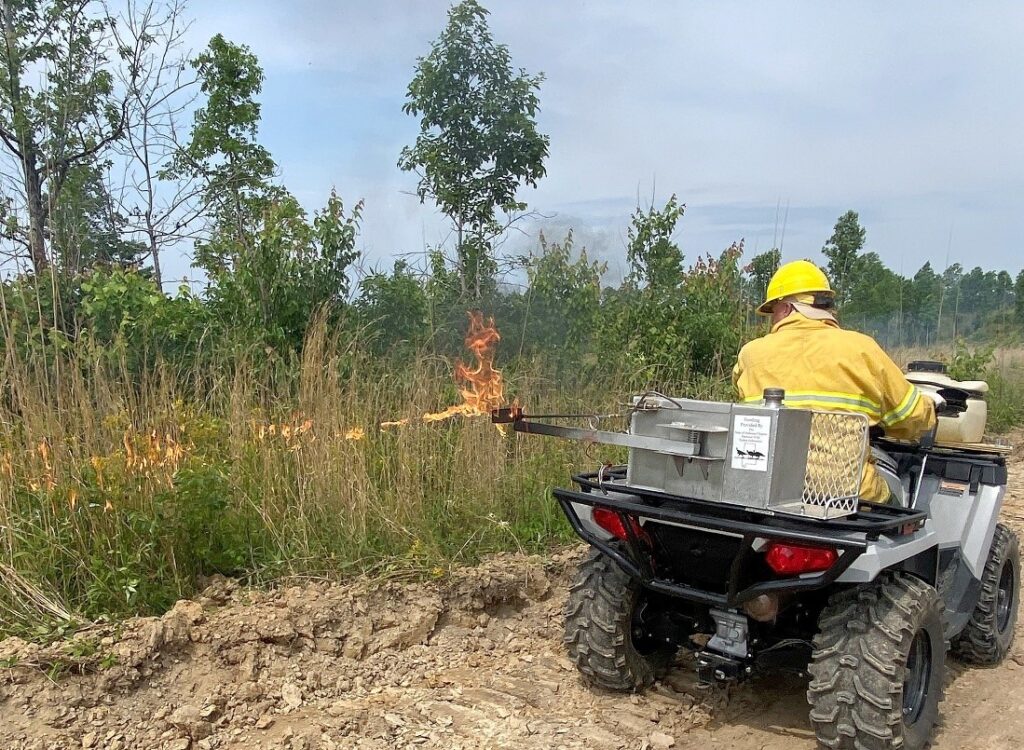
A drip torch provided through the NWTF Super Fund starts a prescribed burn on the Freedom Hills WMA. (ADCNR)
WFF’s Upland Game Bird Coordinator Steven Mitchell echoed Sykes’ sentiments on the impact of the NWTF Alabama State Chapter on the state’s wild turkey habitat.
“The NWTF, and specifically the Alabama State Chapter, continue to provide tremendous support to the Department,” Mitchell said. “They are one of our most valued partners and annually help fund many WFF projects.”
That Super Fund model has helped NWTF chapters enhance more than 20 million acres since the initiative was created.
“Since the inception of the Super Fund, the NWTF has spent $3.2 million on projects across the state,” Mitchell said. “They also created a vehicle specialty tag in 2005, and revenue from those sales funds many projects as well, especially when the number of project requests exceeds the available amount in the Super Fund. They have supported numerous projects – research, trapping equipment, publications, and habitat enhancement projects across the WMA system. Some of the other projects include Archery in the Schools, BOW (Becoming an Outdoors-Woman), trapping workshops and Adult Mentored Hunts.”
Of the $143,000 in Super Fund and tag funds the Alabama Chapter allocated for wild turkey projects in Alabama last August, $35,392 was donated to the WFF to fund projects and the publication of the annual wild turkey report, Full Fans & Sharp Spurs.
“That’s not as much as we normally donate,” Harris said. “The COVID situation just about shut down our fundraising. It affected our ability to hold banquets. But we’ve got some good projects all over the state in conjunction with the ADCNR that should have a great effect.
“We’re also helping to fund turkey research with Dr. (Will) Gulsby at Auburn and Dr. (Mike) Chamberlain at Georgia. We’re excited about that. Everybody is concerned about the number of turkeys in Alabama as well as other states. We wanted to put an emphasis on doing what we can to see what the problems are and see what can be done.”
Mitchell, who sits on the Alabama State Chapter’s Super Fund committee, said natural resources staff from multiple state and federal agencies, as well as local chapters, submit proposals for projects. The committee then reviews and approves the proposals, many of which are centered on early successional habitat management, including prescribed burning and improving habitat in nesting and brooding areas.
“A testament to the State Chapter’s innovation is the fact the current NWTF Super Fund manual, updated in 2020, includes a Super Fund proposal form developed by our folks in Alabama,” he said. “A lot of these projects would potentially be delayed or not happen at all if we didn’t have their support. Since 1985, the Alabama Chapter has assisted with 39 land purchases for about 40,000 acres added to our WMAs and SOAs (special opportunity areas). Hopefully, in the near future, they’ll have the opportunity to help with adding several thousand more acres.”
Harris said the fact that the NWTF has contributed significantly to the rebound in turkey populations around the nation is reason to highlight the organization’s heritage. When NWTF was formed, there were an estimated 1.3 million turkeys in the U.S. Now, the wild turkey population tops 6 million.
“I think the 50th anniversary was an opportunity to celebrate the success we’ve had as we work with all the state agencies all over the United States as far as bringing back turkeys from an almost decimated state to where they are now all over the U.S.,” Harris said. “Restoration of wild turkey is one of the great conservation stories, and NWTF and our partners have been a big part of that.
“I think the passion of the turkey hunter has led to the longevity of the NWTF. The volunteers have been the key to NWTF since it was started 50 years ago by Tom Rogers in Virginia. He was passionate about turkeys and didn’t want to see their habitat destroyed. The volunteers are like a family. That couldn’t have been more evident than two weeks ago in Nashville. I’ve been going to the convention for a long, long time, and I’ve never seen it quite like that before. On Saturday night at the Grand National Auction, there were more than 2,000 people in the room. It was packed.”
However, the NWTF is not content and has set six ambitious goals for its 50th anniversary year: conserve or enhance 1 million acres of wildlife habitat; raise $500,000 for wild turkey research; increase membership to 250,000 members; dedicate $1 million to education and outreach programs; raise $5 million to invest in technology and NWTF’s people; and raise $5 million to build toward a $50 million endowment for the future.

The NWTF Super Fund also supports programs like Archery in Schools. (ADCNR)

